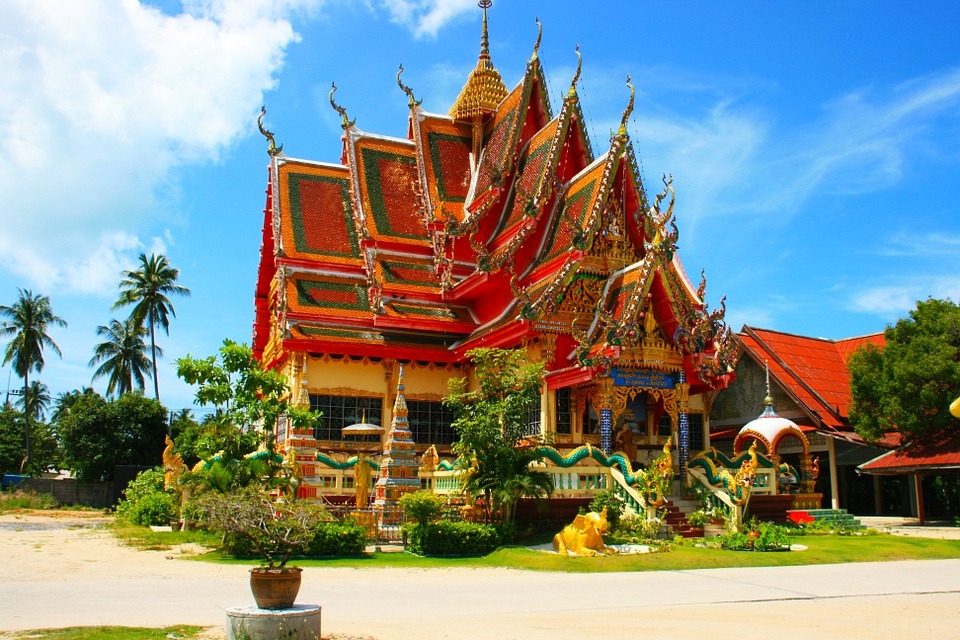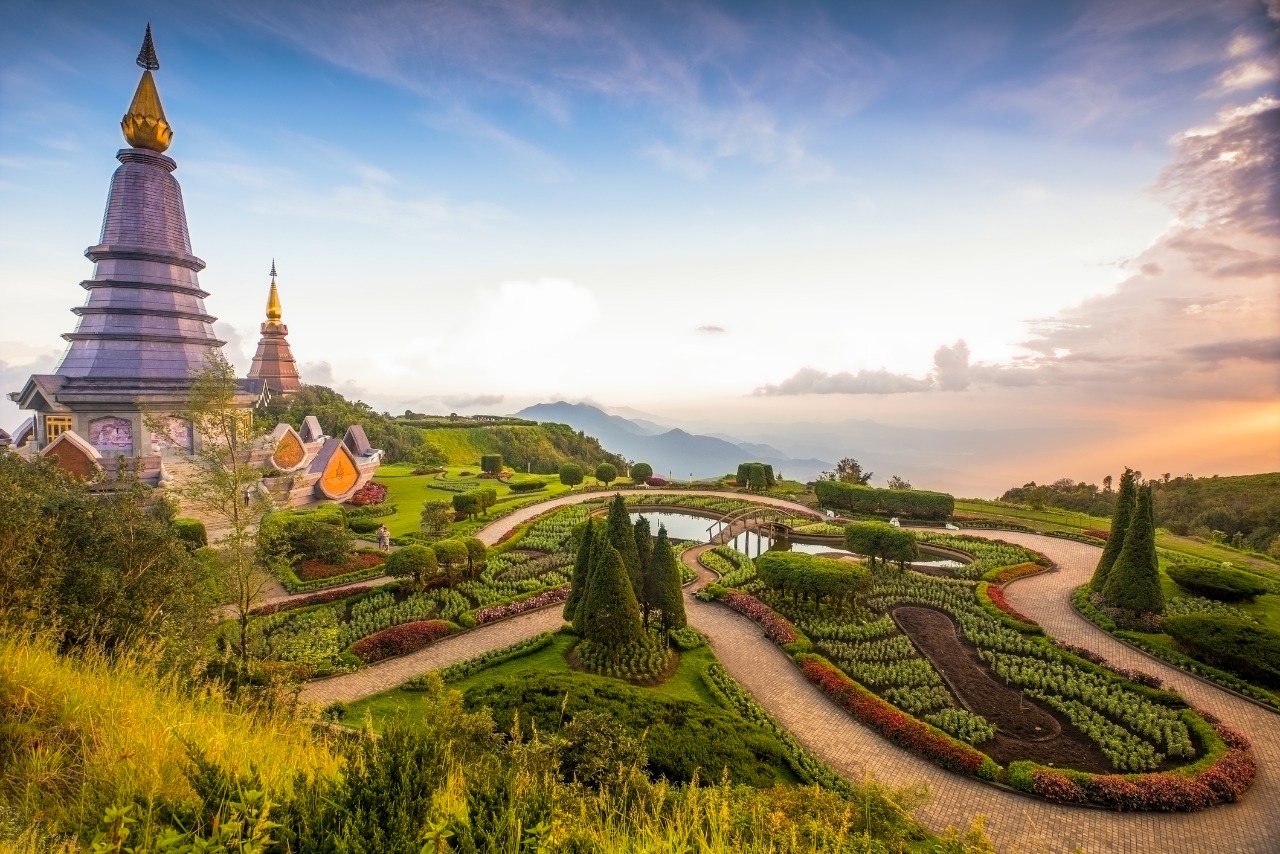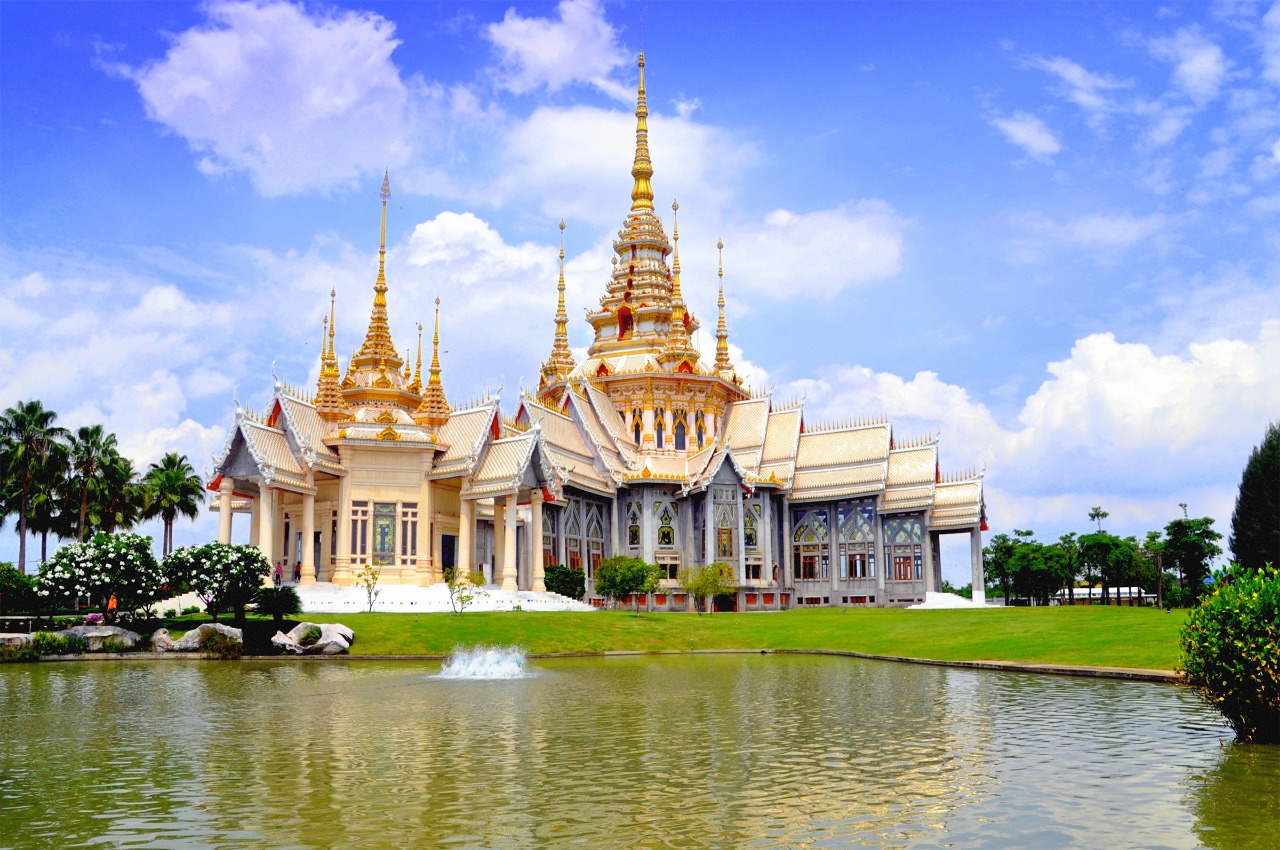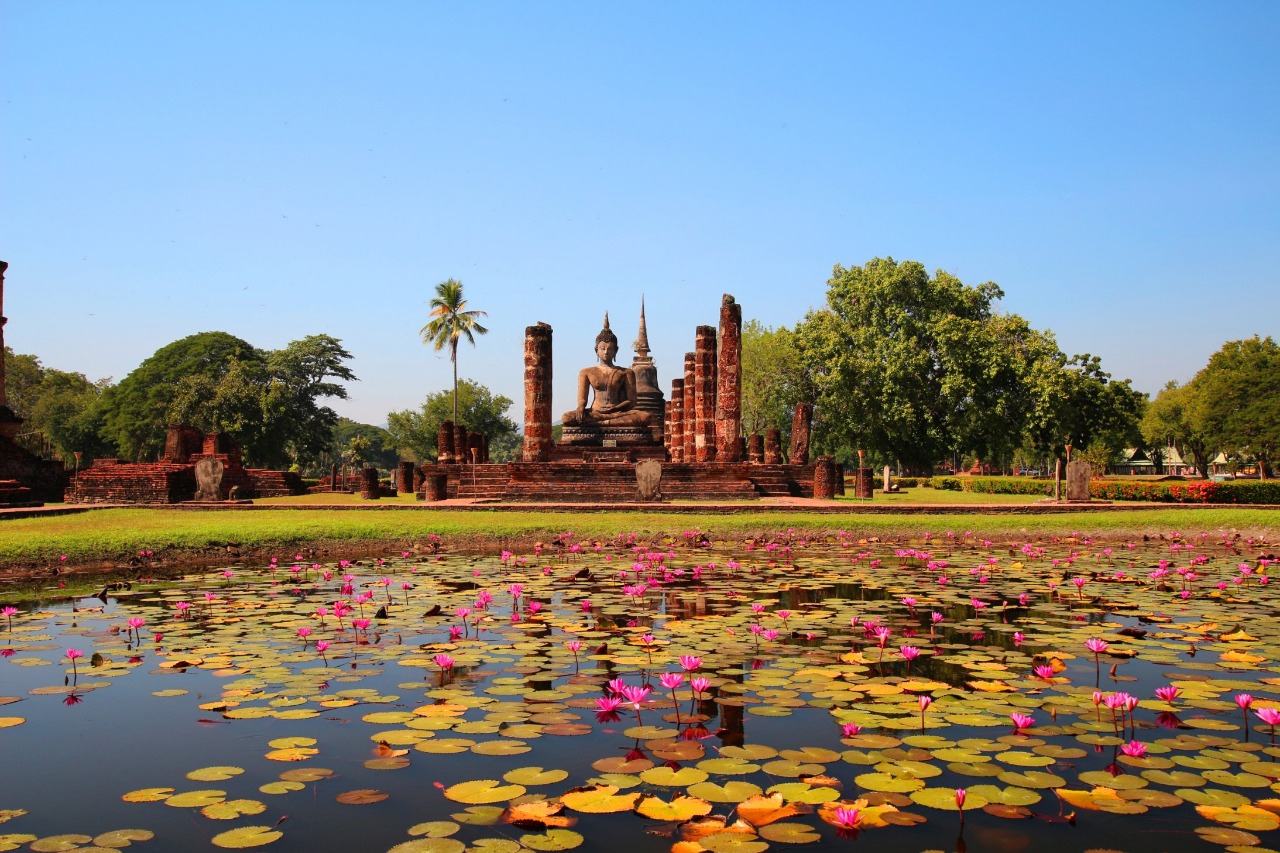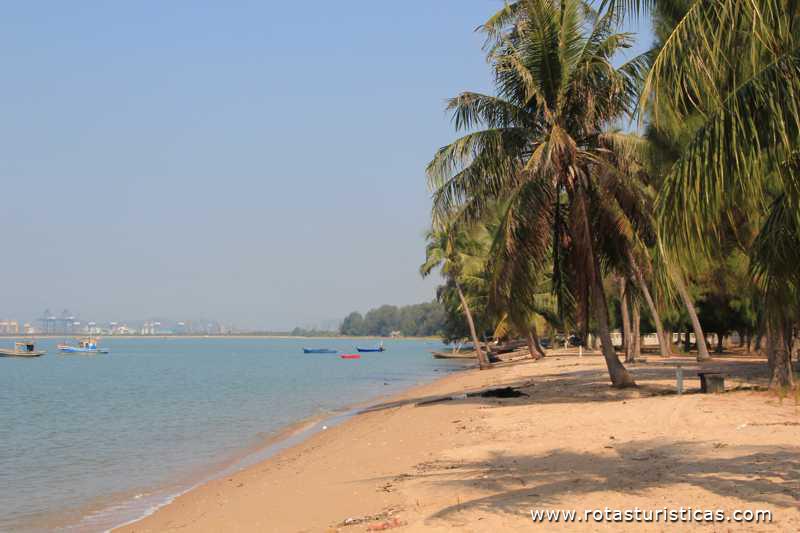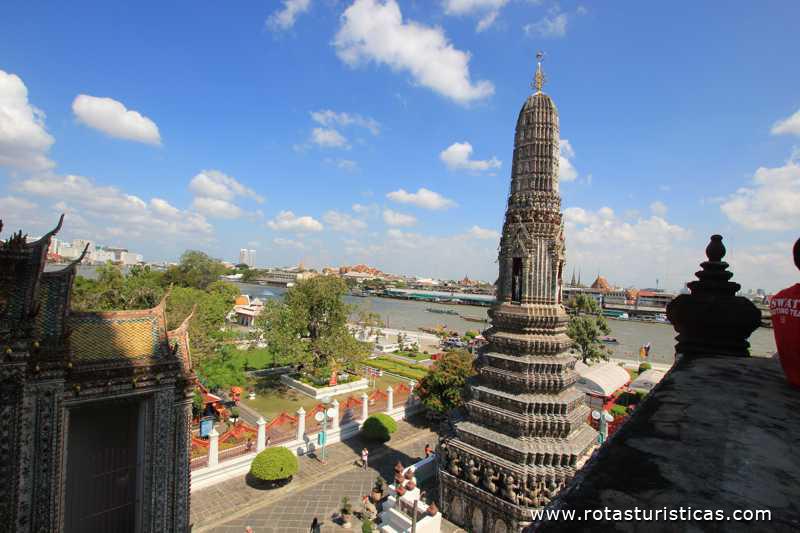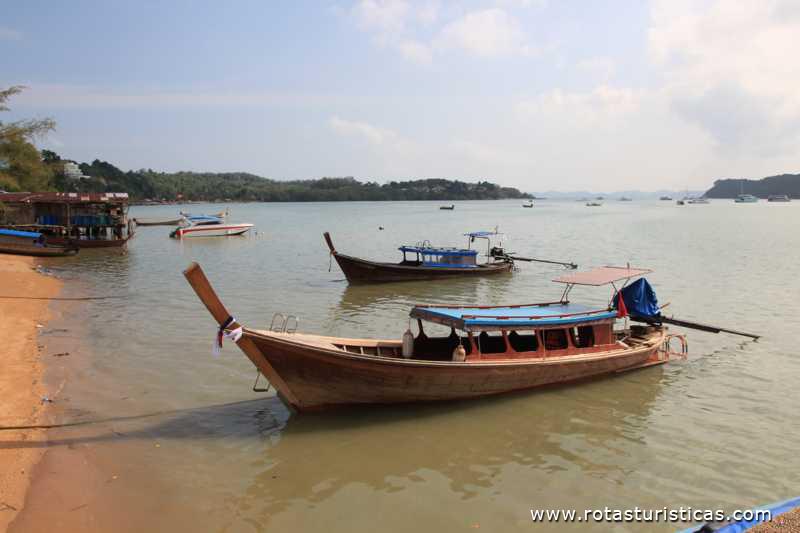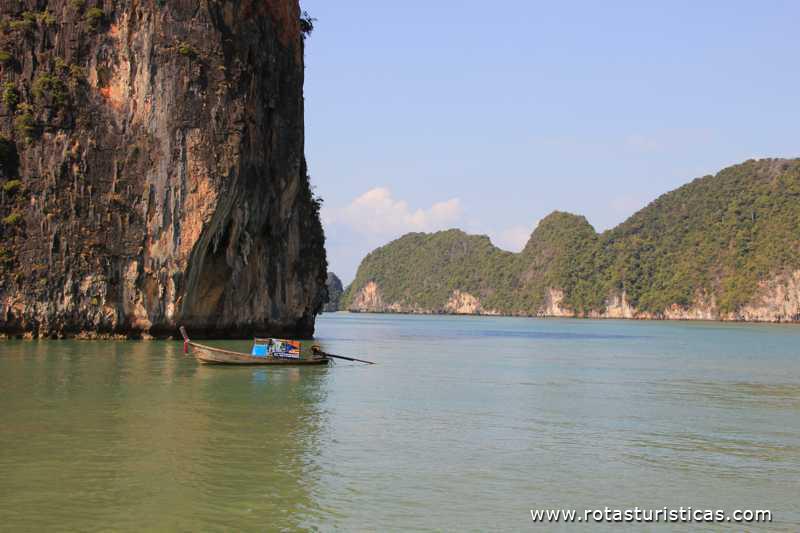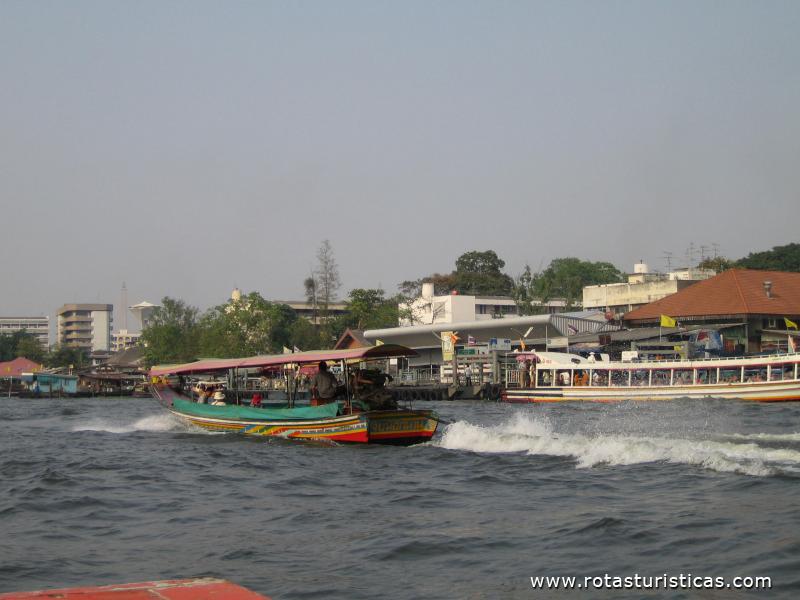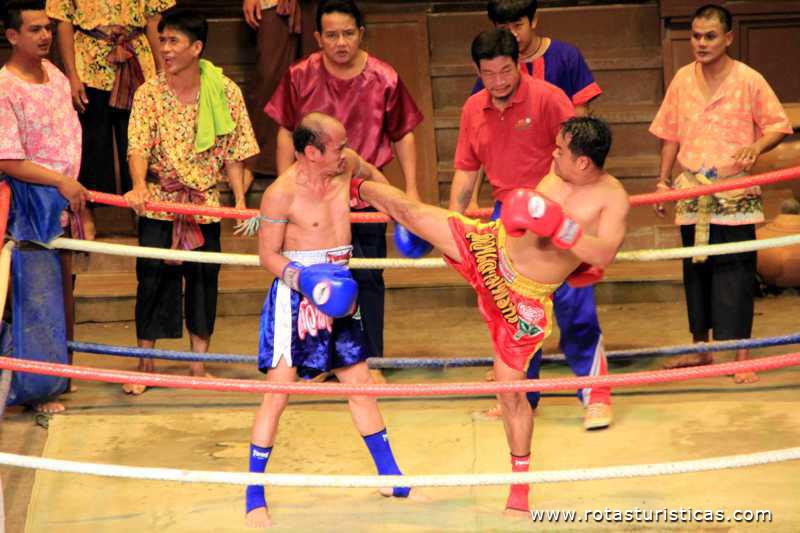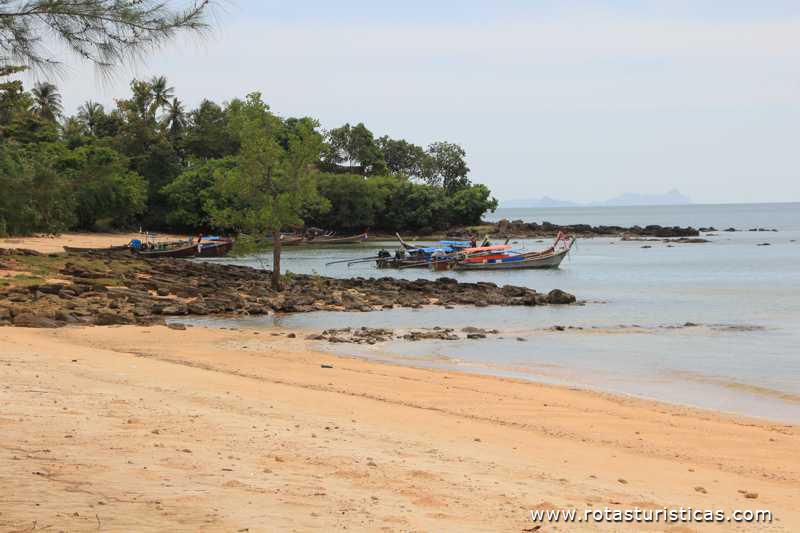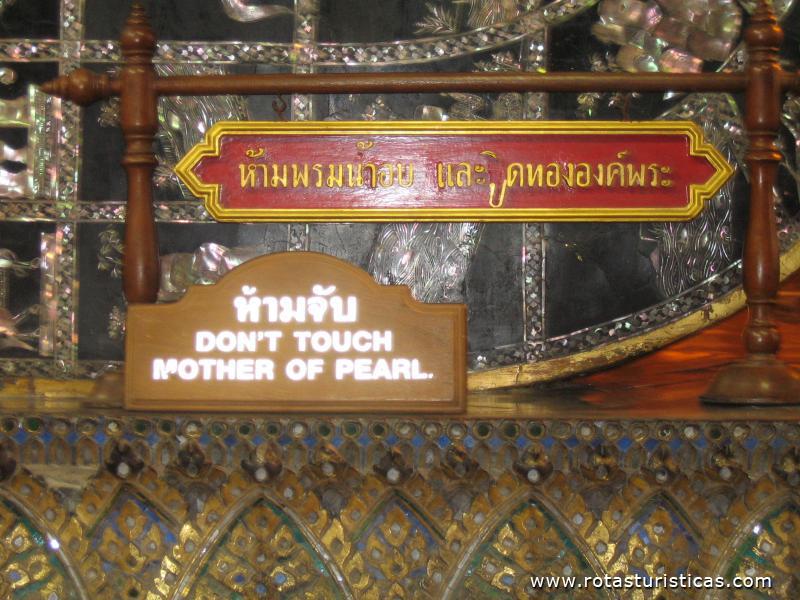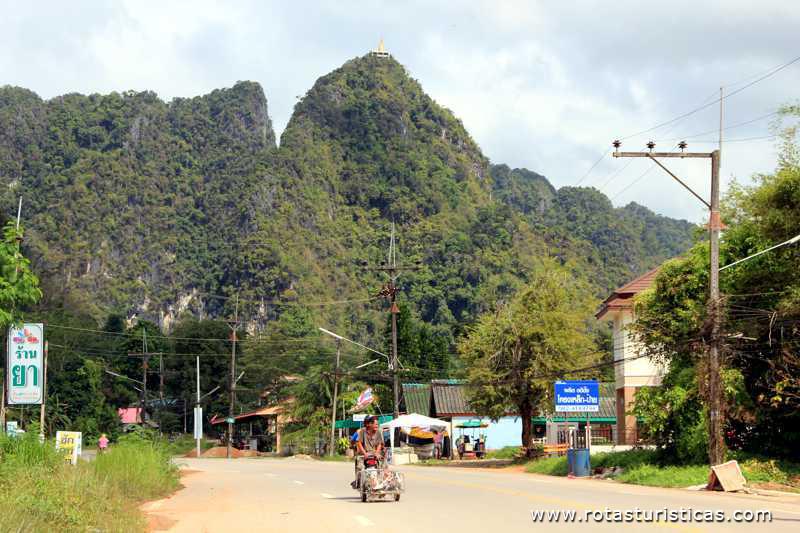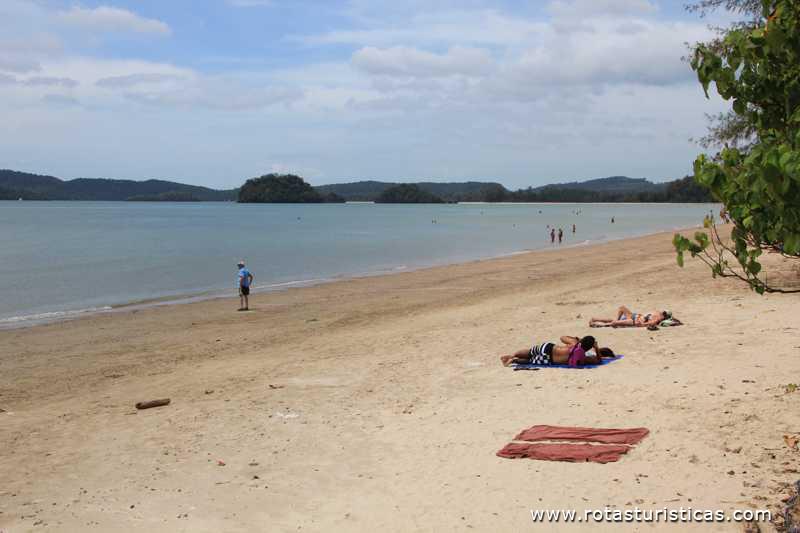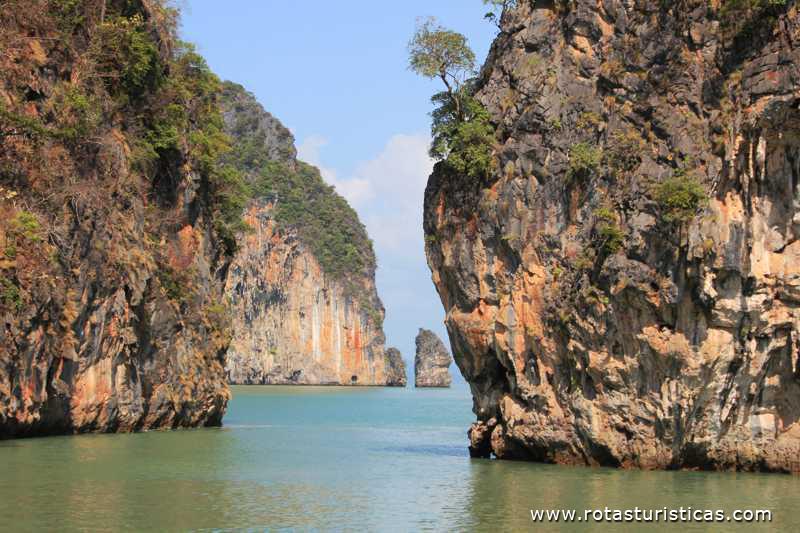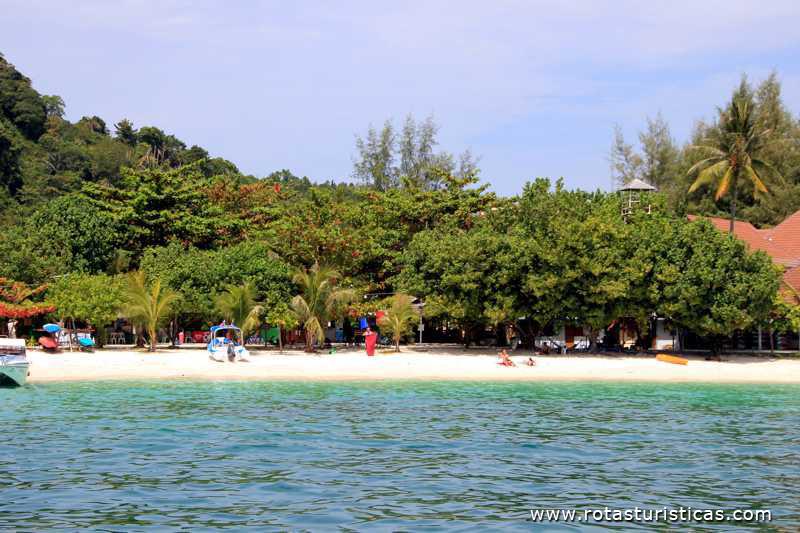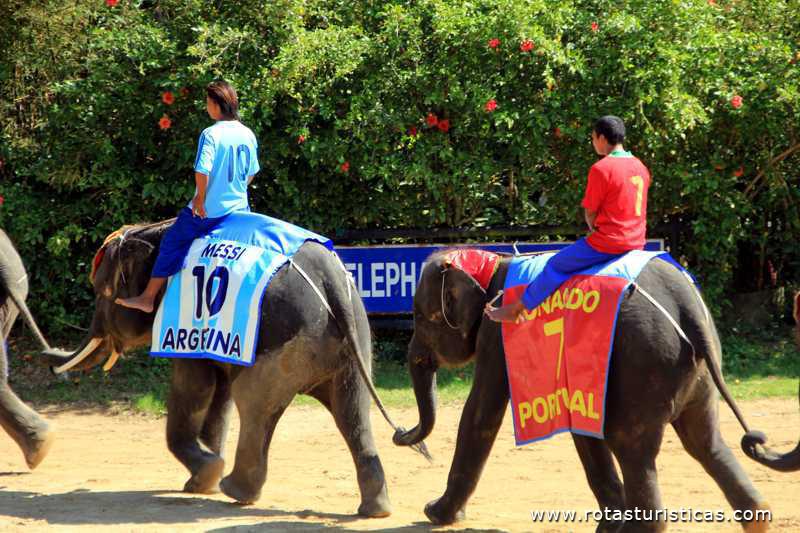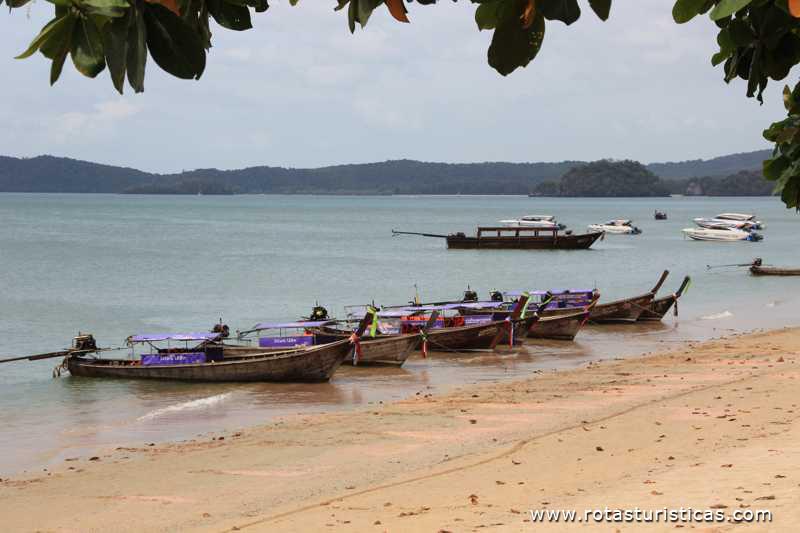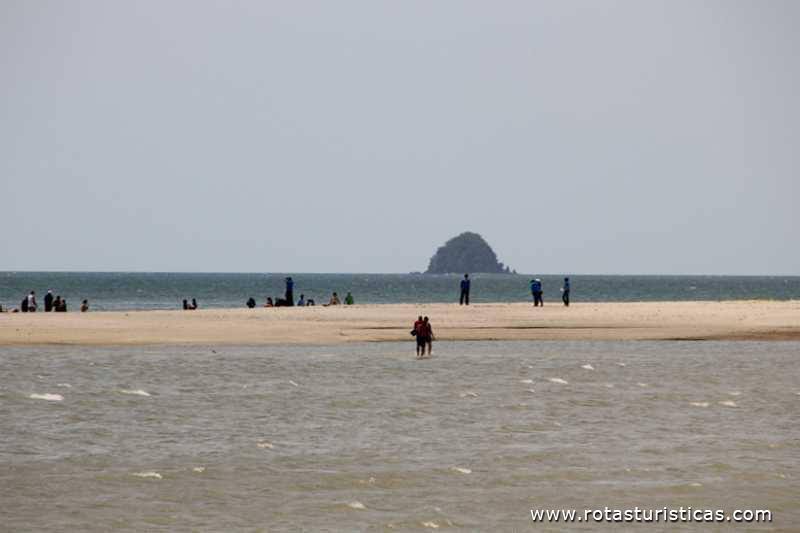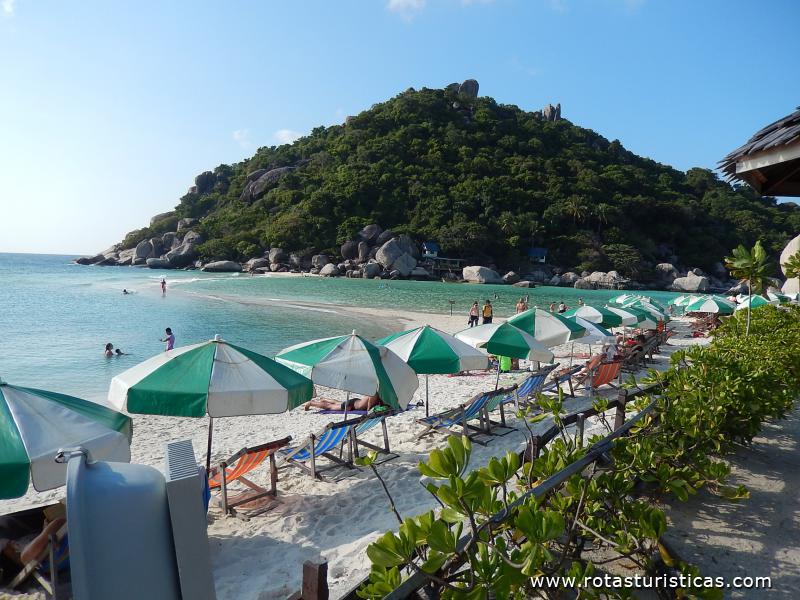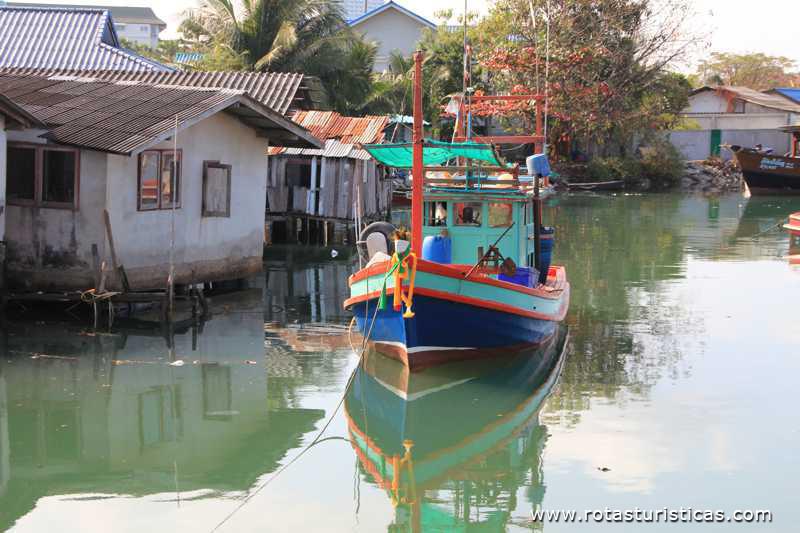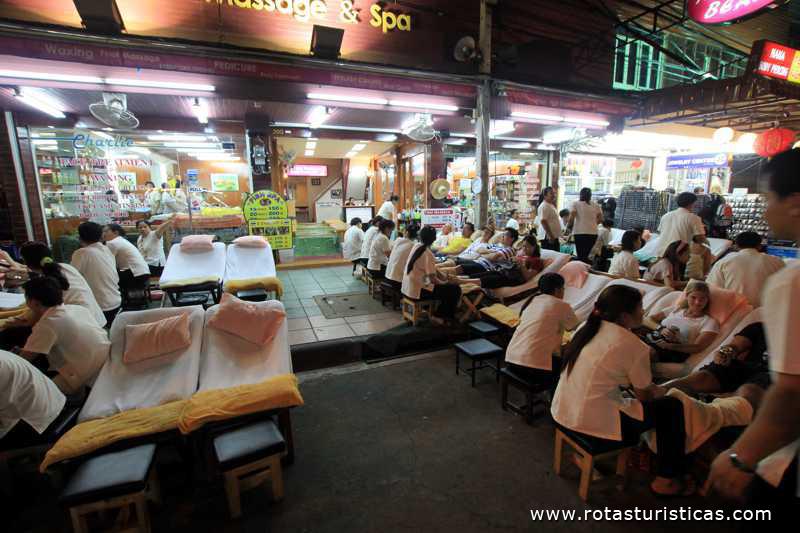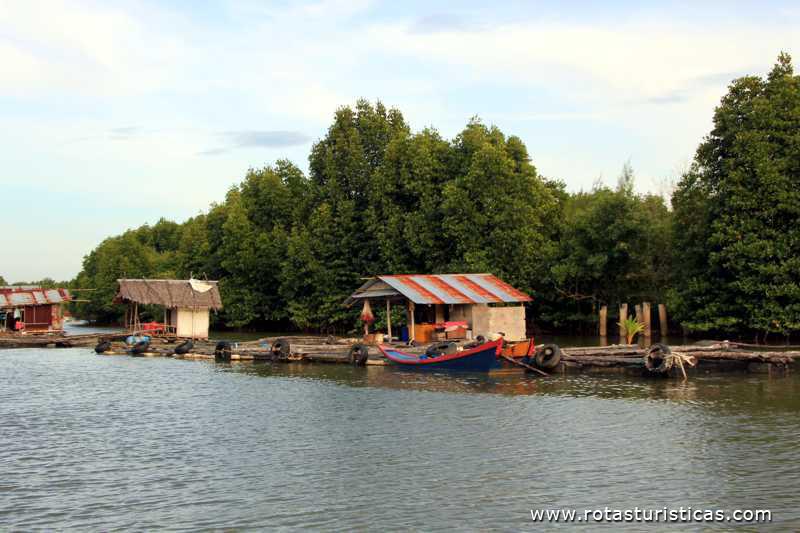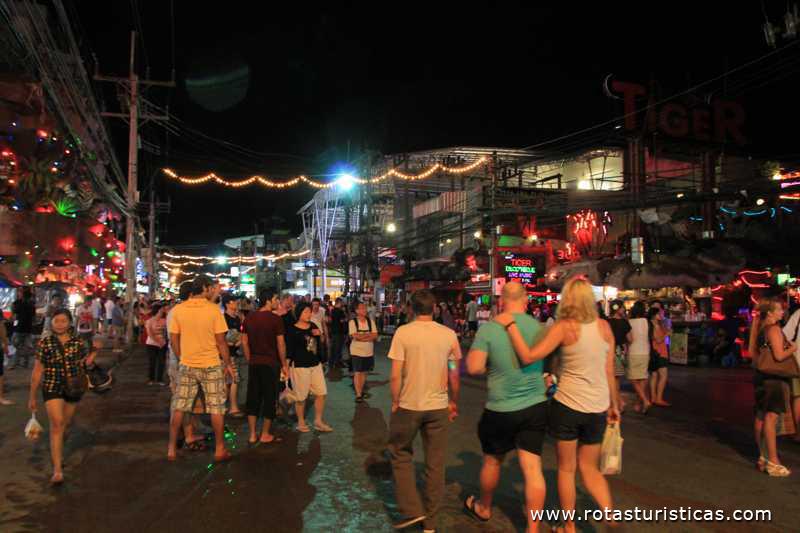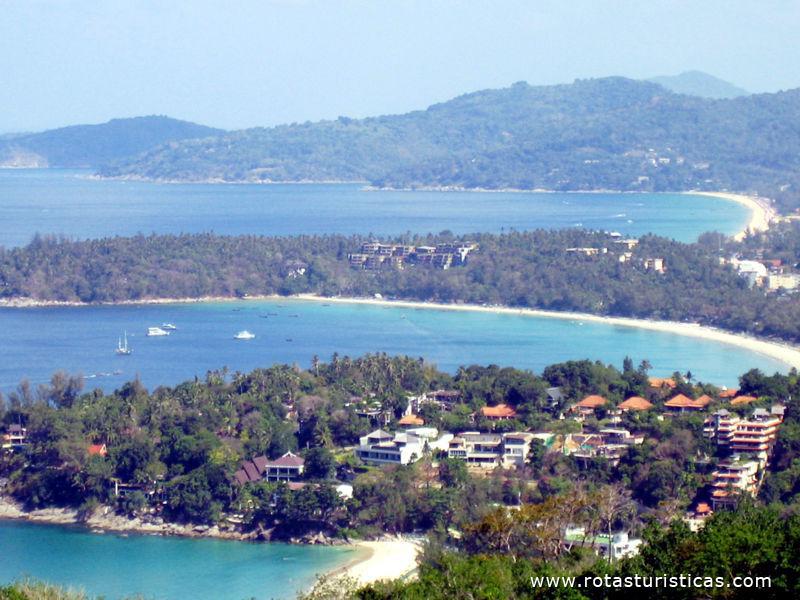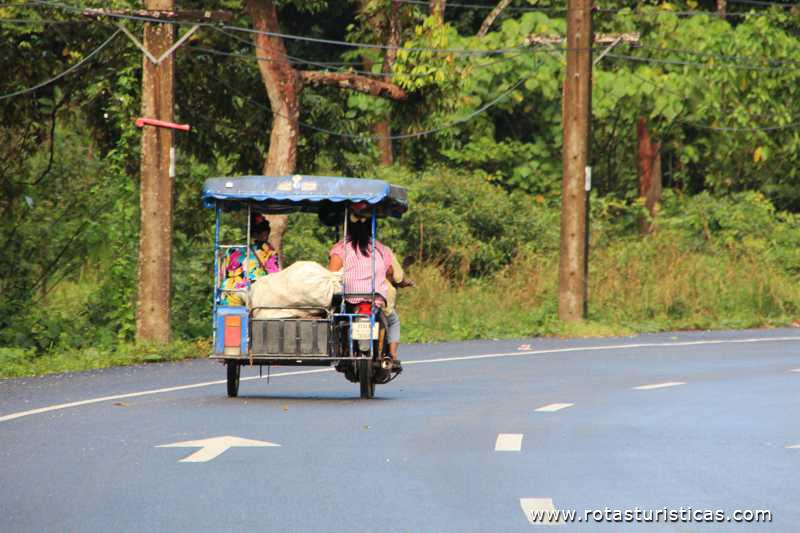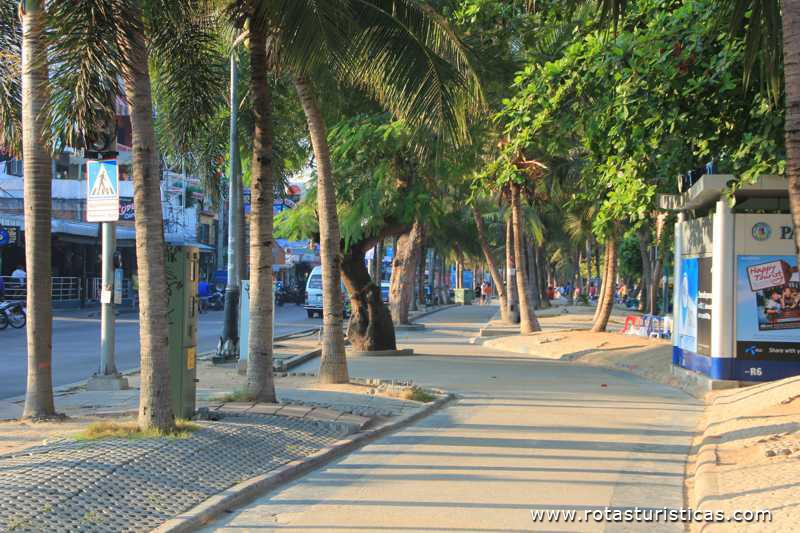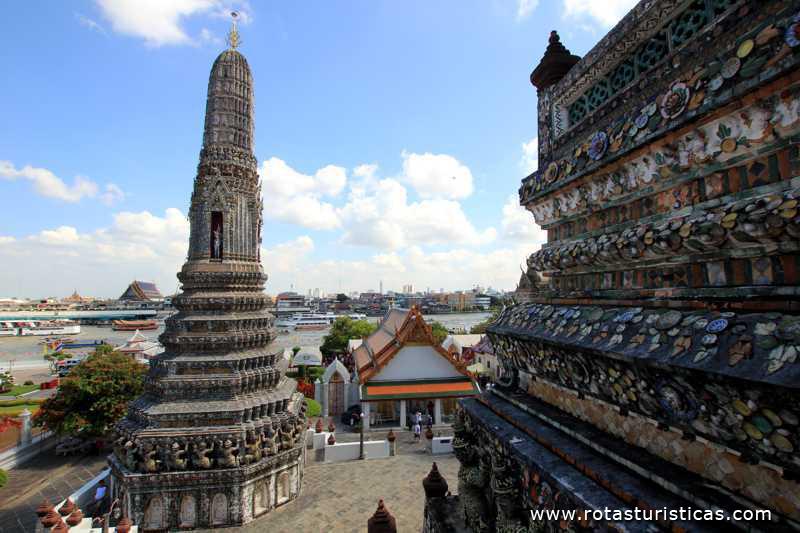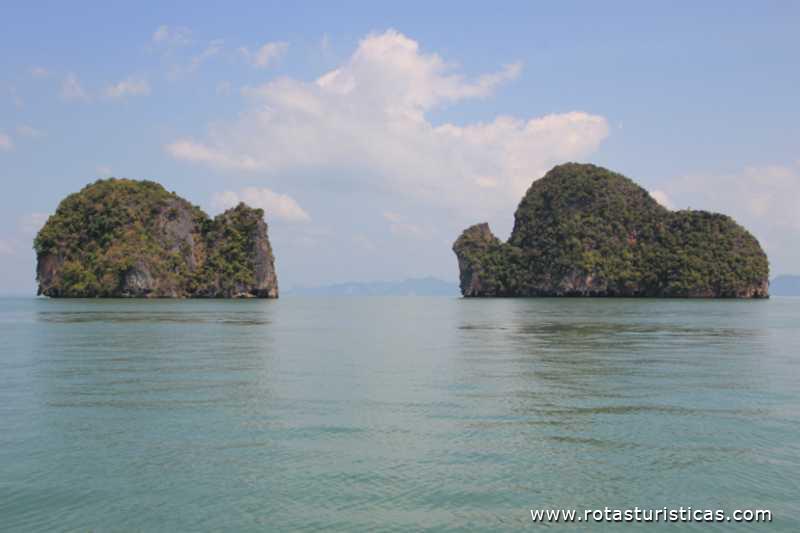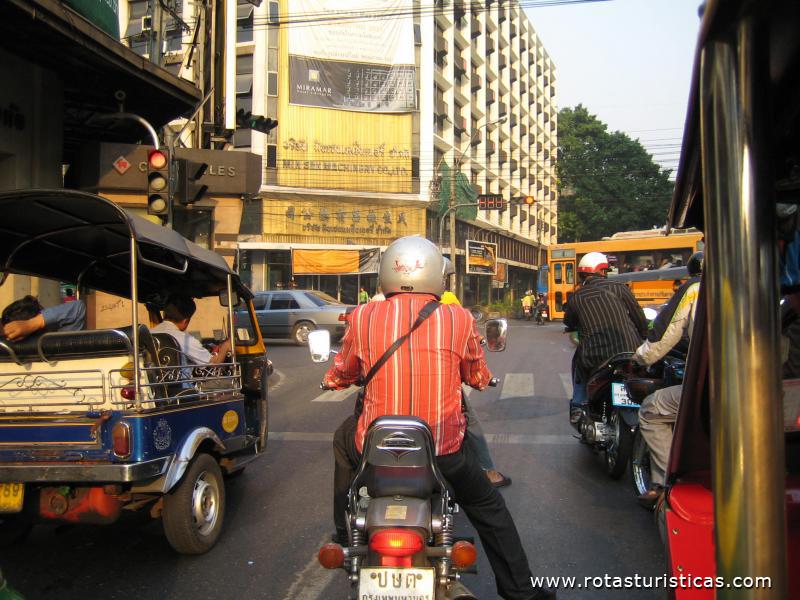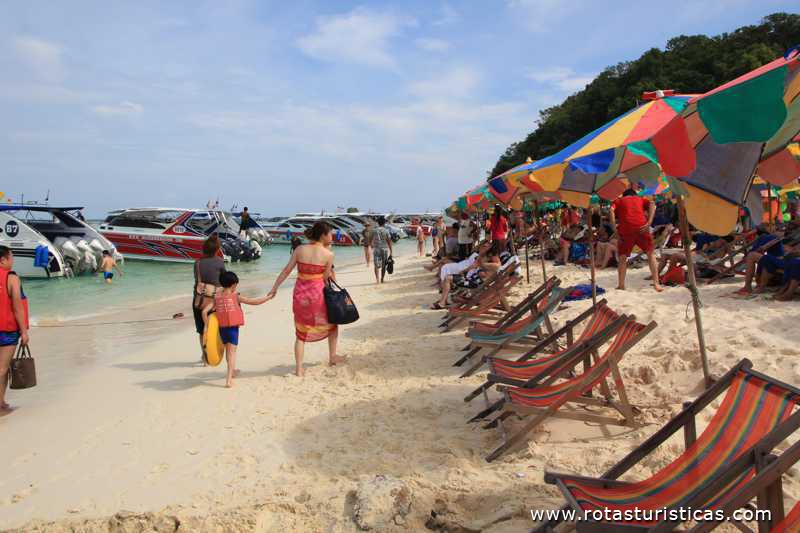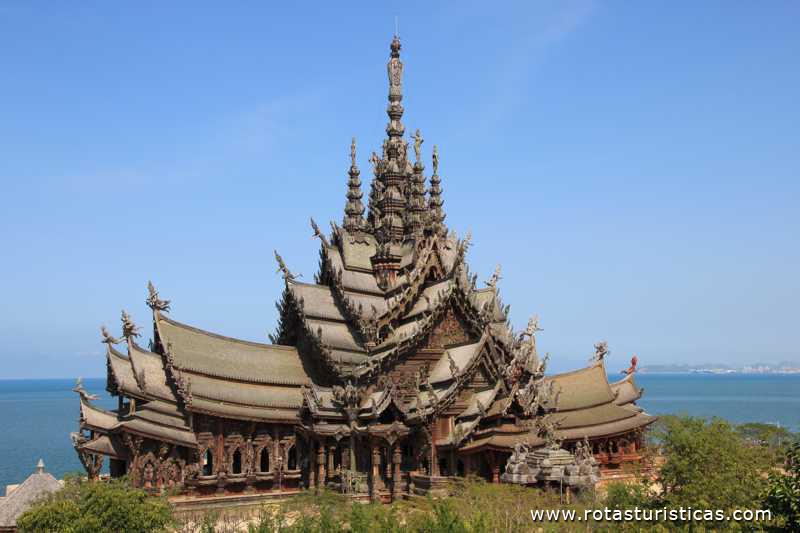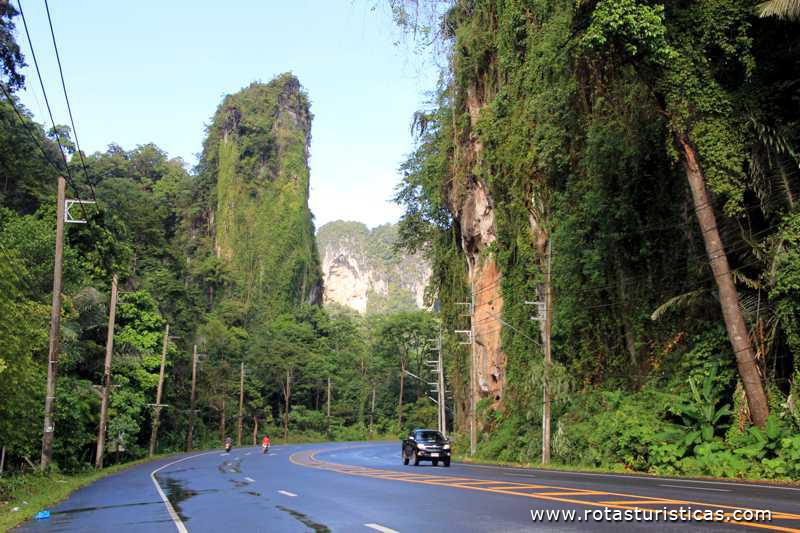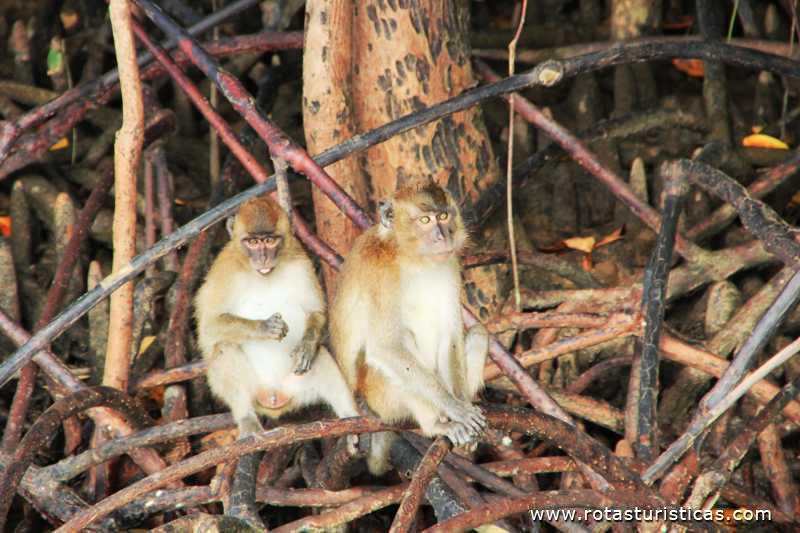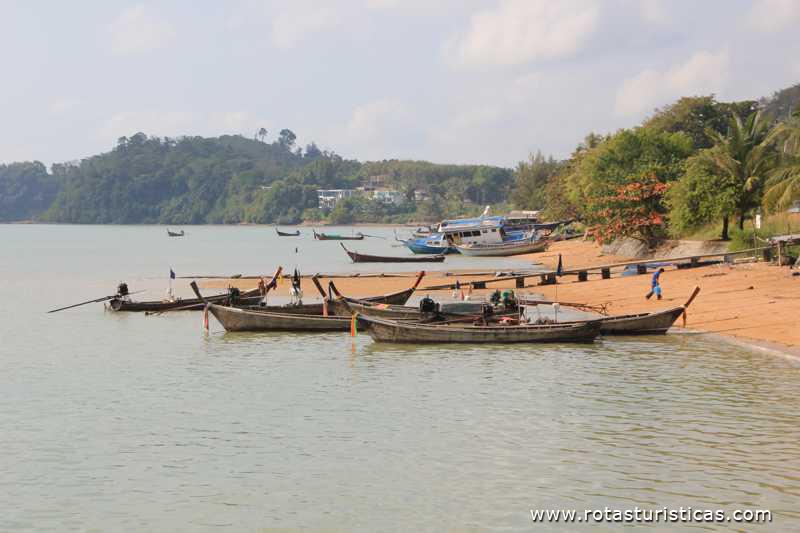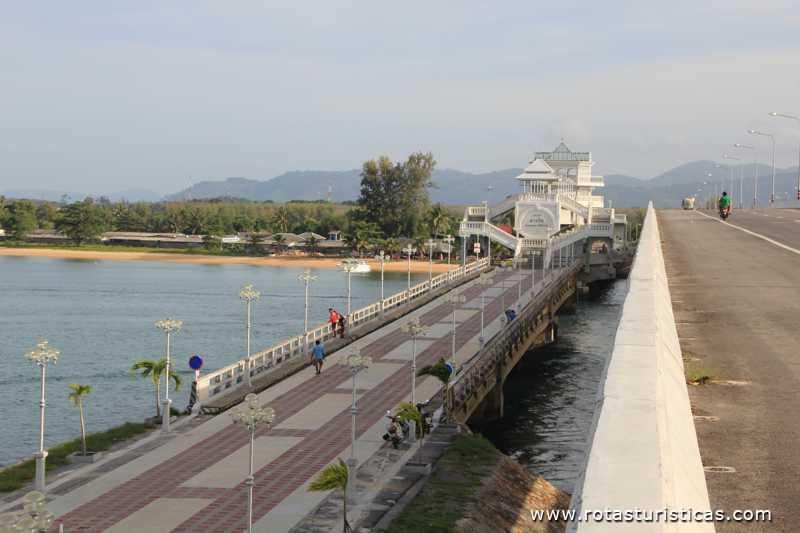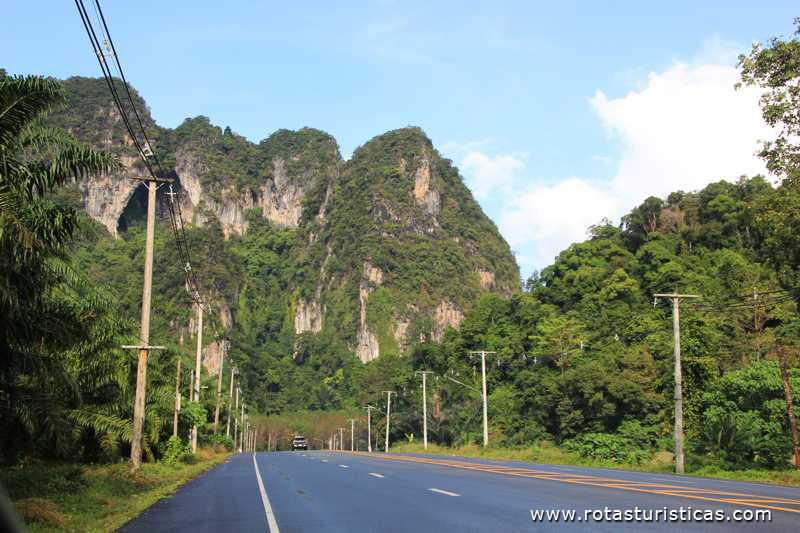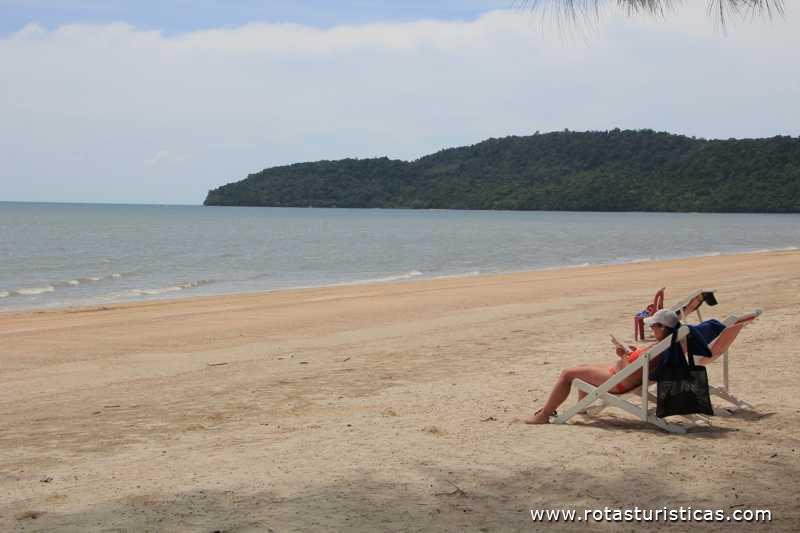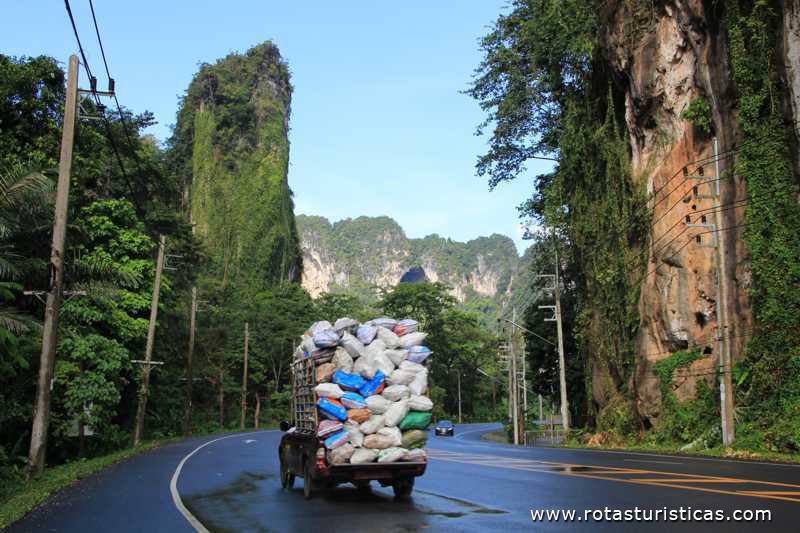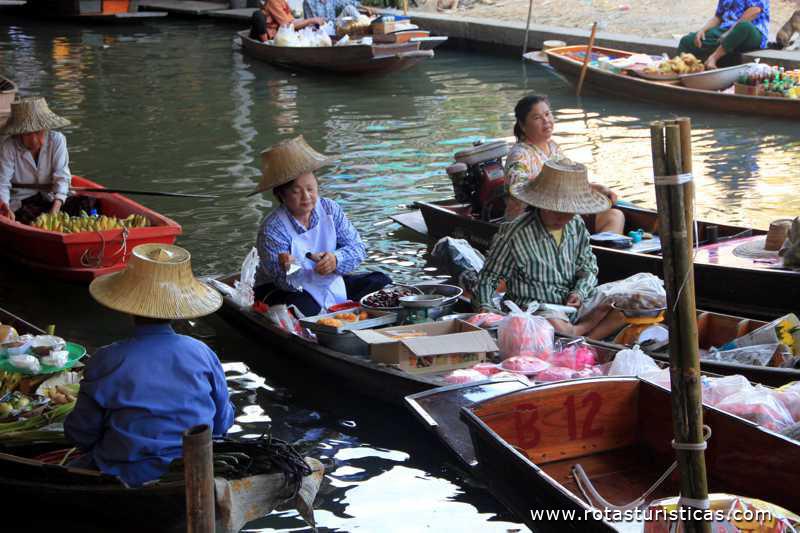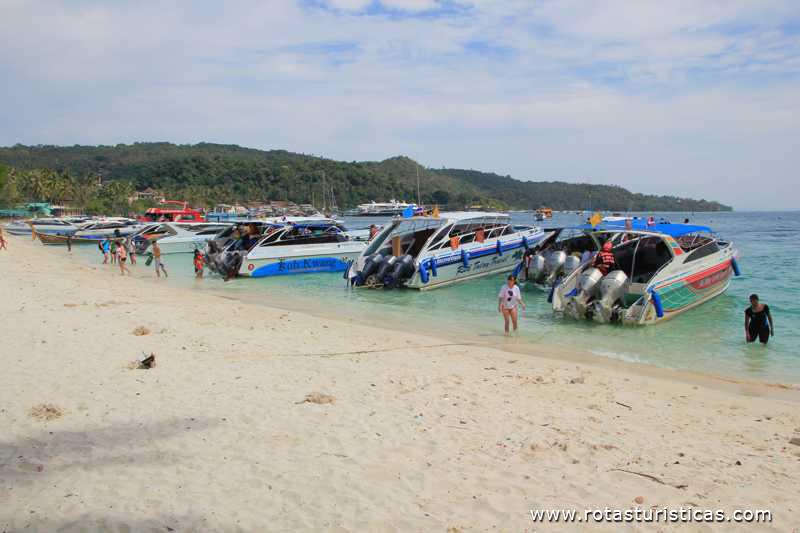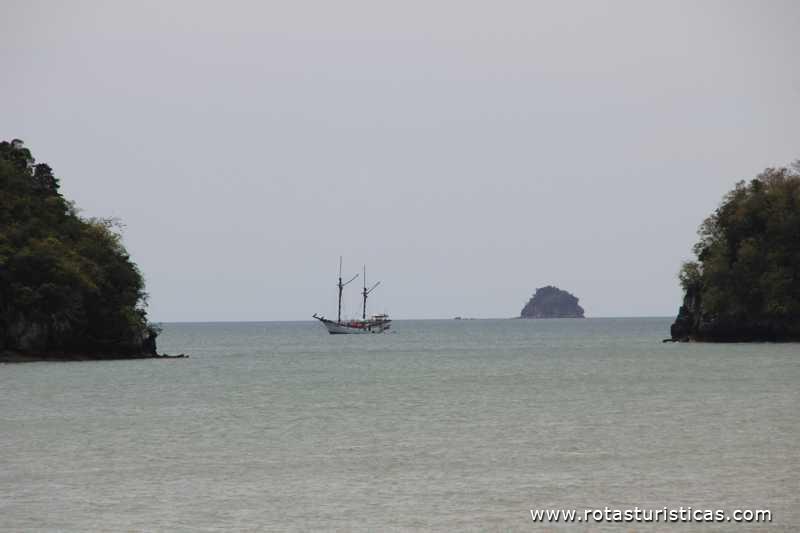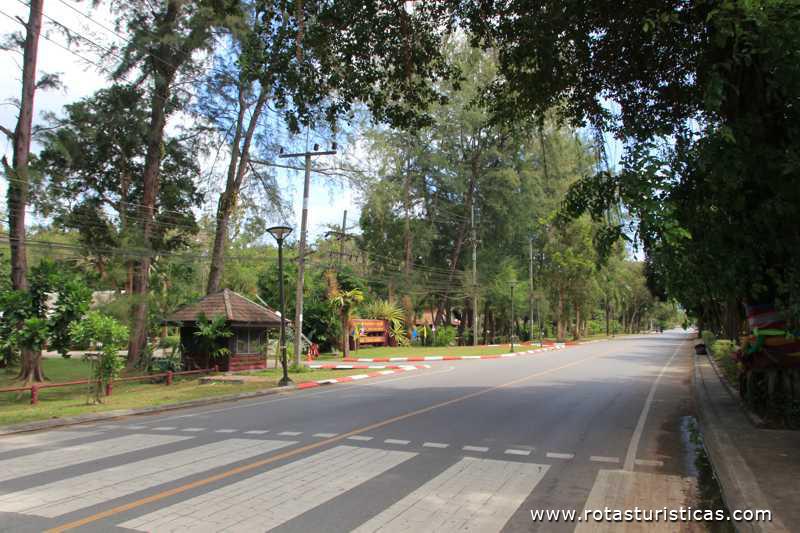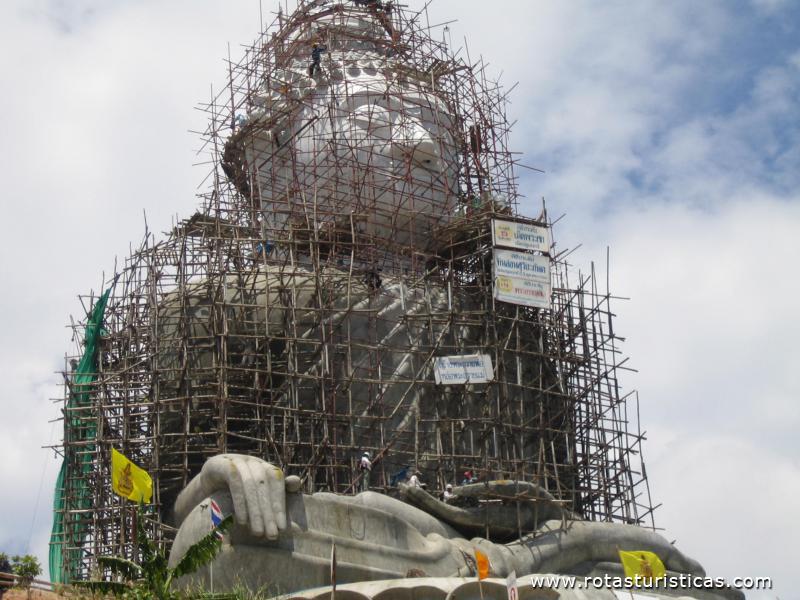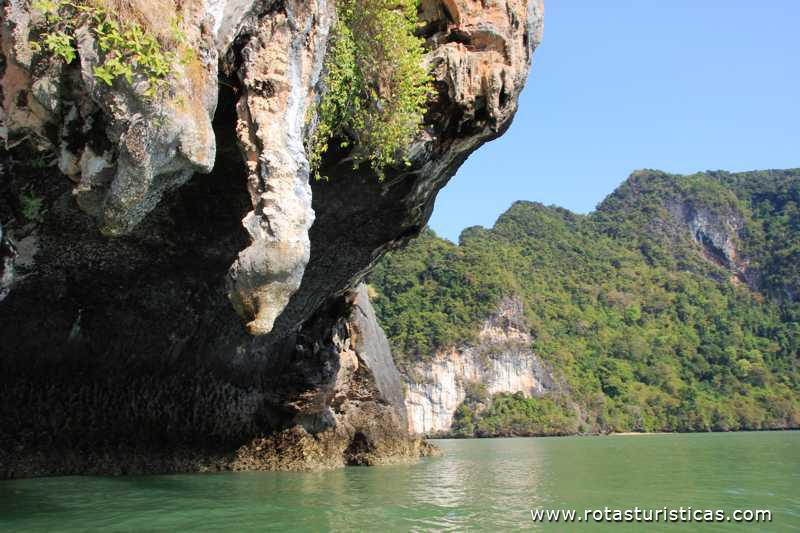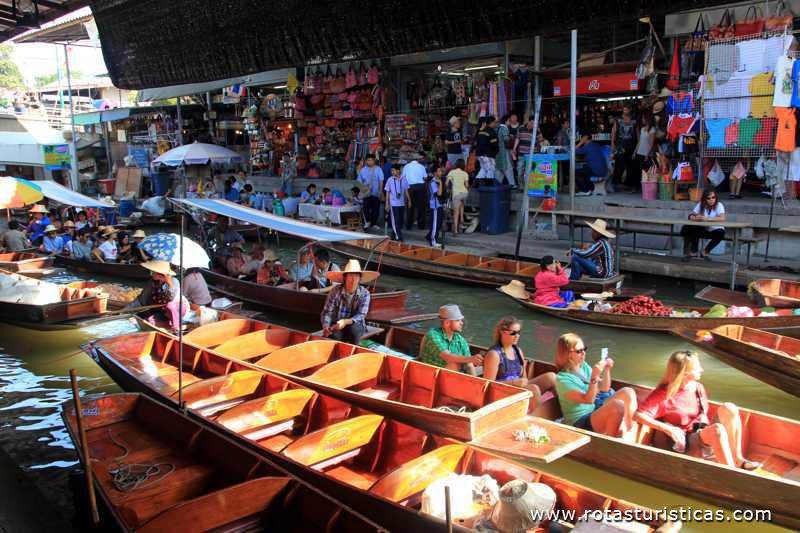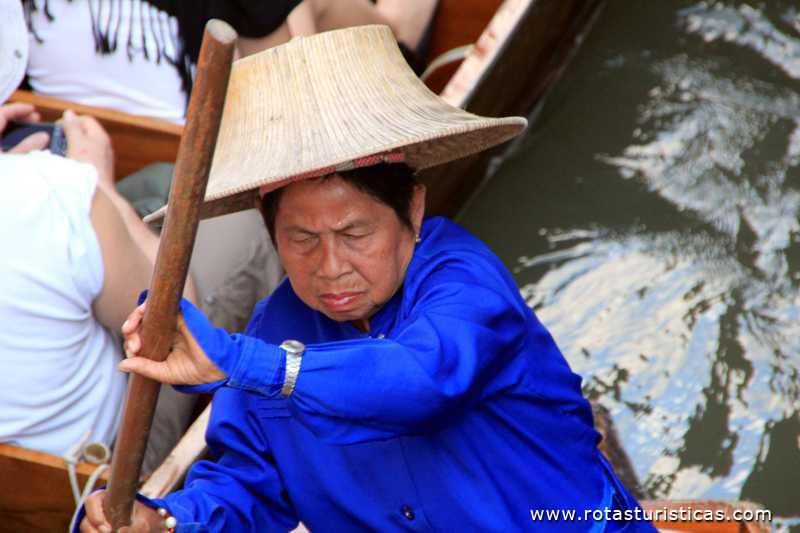Pictures of: Thailand
Location map
Airports
Hotels and other Accommodation
What to visit
Where to Eat
Where to have fun
Consulates & Embassies
World Nomads
The Travel Insurance with the largest coverage

The Travel Insurance with the largest coverage

Thailand
Thailand, formerly known as Siam is an Asian sovereign state situated in the center of the Indochina peninsula and the Malay peninsula. It is bordered to the north by Myanmar and Laos, to the east by Laos and Cambodia, to the south by the Gulf of Thailand and by Malaysia, and to the west by the Andaman Sea and the southern end of Myanmar. Its maritime borders include Vietnam (Vietnam, in Brazilian Portuguese), in the Gulf of Thailand, to the southeast; and Indonesia and India in the Andaman Sea, to the southwest.
The country is a constitutional monarchy, headed by King Bhumibol Adulyadej, the ninth king of the House of Chakri, having headed the nation since 1946, and being the world's oldest head of state as well as the monarch with the greatest reign in Thai history. The King of Thailand is entitled Head of State, Head of the Armed Forces, Defender of the Buddhist Religion and Defender of All Religions.
Thailand is the 50th largest country in the world in territorial area, with an area of approximately 513 115 km², being the 20th most populous on the planet, with an approximate population of 66 million inhabitants. The capital and largest city of the country is Bangkok, which is the political, commercial, industrial and cultural center of Thailand. About 75% of the population is ethnically Thai, 14% is of Chinese origin and 3% is ethnically Malaysian. Minority groups include Mons, Khmers and various tribes. The official language of the country is Thai, with English being the second most spoken language. The main religion is Buddhism, practiced by about 85% of the population.
Thailand's economy experienced significant growth between 1985 and 1996, and is now a newly industrialized country and a major exporter. Tourism also contributes significantly to the Thai economy. There are about 2.2 million legal and illegal immigrants in Thailand, and the country has attracted large numbers of expatriates from developed countries.
The country is a constitutional monarchy, headed by King Bhumibol Adulyadej, the ninth king of the House of Chakri, having headed the nation since 1946, and being the world's oldest head of state as well as the monarch with the greatest reign in Thai history. The King of Thailand is entitled Head of State, Head of the Armed Forces, Defender of the Buddhist Religion and Defender of All Religions.
Thailand is the 50th largest country in the world in territorial area, with an area of approximately 513 115 km², being the 20th most populous on the planet, with an approximate population of 66 million inhabitants. The capital and largest city of the country is Bangkok, which is the political, commercial, industrial and cultural center of Thailand. About 75% of the population is ethnically Thai, 14% is of Chinese origin and 3% is ethnically Malaysian. Minority groups include Mons, Khmers and various tribes. The official language of the country is Thai, with English being the second most spoken language. The main religion is Buddhism, practiced by about 85% of the population.
Thailand's economy experienced significant growth between 1985 and 1996, and is now a newly industrialized country and a major exporter. Tourism also contributes significantly to the Thai economy. There are about 2.2 million legal and illegal immigrants in Thailand, and the country has attracted large numbers of expatriates from developed countries.
Official language
Thai
Currency
Baht
Documentation
Passports must be valid for more than 6 months, plus travel time, as it depends on the granting of visas at the arrival or transit airports.
If the traveler enters Thailand by air, they will be allowed a stay in the country up to 30 days or, in case of entry by land, up to 15 days.
If the traveler enters Thailand by air, they will be allowed a stay in the country up to 30 days or, in case of entry by land, up to 15 days.
Tourism
Getting to know Thailand is like opening the curtain to a new world. Only with the receptive mind and the refined senses can we absorb the smells, colors, tastes and gestures that bombard us at every step, always at a greater intensity than our western parameters expect. This whirlwind of unprecedented sensations gives each stranger the strange sensation of being the first to step on every inch of white sand, jungle or asphalt.
The secret of the success of the country's champion tourism in Southeast Asia lies in the perfect mix of culture, hedonism and exoticism. To the south, the beaches of Koh Phi Phi and Phuket, among many others, deliver on a tray an extensive menu of worldly pleasures, spread over vast stretches of fine white sand, surrounded by scenarios whose beauty is insulting. To the north, this Buddhist country exposes its spirituality to the zest of sacred cities like Ayutthaya and the temples of Chiang Mai, which was once its (religious, even) capital. In frenzied Bangkok, the Thai frenzy reaches its peak, in one of the most fascinating metropolises on the planet where 6 million people live among temples, skyscrapers and neon lights.
Trying to Thailand is to burn your tongue in spicy (and absolutely delicious) recipes, such as the fried noodles phad thai and the spicy fish pla samrod) to learn how to say "no spicy") in a very private way of speaking English. It is to understand the unconditional love (in the 21st century) of the people by King Bhumibol Adulyadej, who has held the throne for more than 60 years. It is to express your gratitude in a simple wai, the head tilt that replaces the physical contact. It is to understand the deep meaning of the stick "same same, but different" (translating: equal but different). It is to live emotions never before navigated.
The secret of the success of the country's champion tourism in Southeast Asia lies in the perfect mix of culture, hedonism and exoticism. To the south, the beaches of Koh Phi Phi and Phuket, among many others, deliver on a tray an extensive menu of worldly pleasures, spread over vast stretches of fine white sand, surrounded by scenarios whose beauty is insulting. To the north, this Buddhist country exposes its spirituality to the zest of sacred cities like Ayutthaya and the temples of Chiang Mai, which was once its (religious, even) capital. In frenzied Bangkok, the Thai frenzy reaches its peak, in one of the most fascinating metropolises on the planet where 6 million people live among temples, skyscrapers and neon lights.
Trying to Thailand is to burn your tongue in spicy (and absolutely delicious) recipes, such as the fried noodles phad thai and the spicy fish pla samrod) to learn how to say "no spicy") in a very private way of speaking English. It is to understand the unconditional love (in the 21st century) of the people by King Bhumibol Adulyadej, who has held the throne for more than 60 years. It is to express your gratitude in a simple wai, the head tilt that replaces the physical contact. It is to understand the deep meaning of the stick "same same, but different" (translating: equal but different). It is to live emotions never before navigated.
Gastronomy
Aromas, flavors ... Thailand is undoubtedly a paradise for those who enjoy good cuisine. The richness of its ingredients, the refinement of the presentation, a great creativity, and its exoticism make Thai cuisine one of the richest in the whole East.
Rice is one of the foods that is never missing at the Thai table. Serves in multiple ways: boiled, fried or in soup. In the North zone, the cultivated variety is more gelatinous, being better known like "sticky rice".
Sauces prepared with various ingredients are guaranteed to be the basis of gastronomy. Malaguetas, crab pates, garlic and spices. They are not limited to being used only as seasoning, playing a specific role, such as fish sauce, (nam pla), which in many dishes replaces salt. Others are used to highlight certain flavors, such as fermented oyster sauce or like others that incorporate coconut milk to soften flavors.
Thai breakfast may surprise you by its abundance. It is usually made from chicken rice, pork, prawns with garlic, accompanied by a starry egg and small cucumbers in vinegar. In fact, coffee is not necessary to wake the body.
Lunch is lighter and usually consists of just a plate of fried rice, pasta with some cold sandwiches and vegetables.
Dinner is the most important meal of the day. In it they focus on quality, quantity and flavor, the best ingredients of Thai cuisine - rice soup, fish or chicken, salads, greens, sauces and desserts.
Another of the most important aspects is the presentation, the delicacy and the art with which each dish comes to the table, never missing the floral arrangements nor the cut fruits or vegetables in the most artistic and creative ways. When we sit in a restaurant, we come across a rainbow of smells, colors and flavors capable of captivating the most demanding of gourmets.
Rice is one of the foods that is never missing at the Thai table. Serves in multiple ways: boiled, fried or in soup. In the North zone, the cultivated variety is more gelatinous, being better known like "sticky rice".
Sauces prepared with various ingredients are guaranteed to be the basis of gastronomy. Malaguetas, crab pates, garlic and spices. They are not limited to being used only as seasoning, playing a specific role, such as fish sauce, (nam pla), which in many dishes replaces salt. Others are used to highlight certain flavors, such as fermented oyster sauce or like others that incorporate coconut milk to soften flavors.
Thai breakfast may surprise you by its abundance. It is usually made from chicken rice, pork, prawns with garlic, accompanied by a starry egg and small cucumbers in vinegar. In fact, coffee is not necessary to wake the body.
Lunch is lighter and usually consists of just a plate of fried rice, pasta with some cold sandwiches and vegetables.
Dinner is the most important meal of the day. In it they focus on quality, quantity and flavor, the best ingredients of Thai cuisine - rice soup, fish or chicken, salads, greens, sauces and desserts.
Another of the most important aspects is the presentation, the delicacy and the art with which each dish comes to the table, never missing the floral arrangements nor the cut fruits or vegetables in the most artistic and creative ways. When we sit in a restaurant, we come across a rainbow of smells, colors and flavors capable of captivating the most demanding of gourmets.
Weather
Thailand has a tropical climate, that is, humid and hot, with three seasons: temperate, hot and rainy.
The best time to travel is between the months of November and February, which coincides with the temperate season. In this period, the average temperature is 20 ° C, with a moisture content around 55%.
During the hot season, from March to May, the temperature can rise to 30º C, on average, and can reach values close to 40º C in some areas. At this time, the moisture content rises considerably.
From June to October, we are in the rainy season; the monsoons make their appearance with different incidence according to the zones. If, in the North, their intensity may be scarce, in the South, their presence may reveal itself with great violence. The temperature fluctuates between 24º and 34º C, although the sensation of heat may seem much higher, since humidity rates are around 80% in this period.
The best time to travel is between the months of November and February, which coincides with the temperate season. In this period, the average temperature is 20 ° C, with a moisture content around 55%.
During the hot season, from March to May, the temperature can rise to 30º C, on average, and can reach values close to 40º C in some areas. At this time, the moisture content rises considerably.
From June to October, we are in the rainy season; the monsoons make their appearance with different incidence according to the zones. If, in the North, their intensity may be scarce, in the South, their presence may reveal itself with great violence. The temperature fluctuates between 24º and 34º C, although the sensation of heat may seem much higher, since humidity rates are around 80% in this period.
Safety
It should be borne in mind that, although it had been lifted on June 13, 2014 for the whole country, the obligatory curfew can nevertheless be reintroduced on a case-by-case basis, where appropriate, and travelers should be informed accordingly.
It should also be remembered that some insurance companies do not pay expenses caused by political developments such as coups d'état, so it is advisable to consult them before the start of the trip.
Precautions and special advices
Visitors should avoid places where demonstrations are taking place or where large concentrations of people occur.
Passports should never be handed over to third parties, be they police officers, jetski or motorbike hired or hotel employees.
In case of conflict, the traveler should not raise his voice or stop smiling, even when and especially if he is threatened with white or firearms.
There have been a lot of scams in precious stone shops, with tuk tuks, especially those in tourist places, and motorcycle rentals, including the requirement to pay for damages that were not caused, extortion, retention of passports, collection of amounts too high for the services provided, deviations of course as well as theft of the passengers by the drivers themselves.
There is also a record of stealing by motorcyclists to pedestrians and "tuk tuks" passengers.
There have also been accidents involving motorcycles and buses involving foreign nationals and resulting in injuries or even death, so that the traveler should demand the use of a helmet in the event of a motorcycle rental or always take a "taxi-motorcycle" whose driver use.
When paying the freight to tuk tuk drivers or taxis, the traveler should not approach the wallet in such a way that they can get it out of hand and run away.
It should also be remembered that some insurance companies do not pay expenses caused by political developments such as coups d'état, so it is advisable to consult them before the start of the trip.
Precautions and special advices
Visitors should avoid places where demonstrations are taking place or where large concentrations of people occur.
Passports should never be handed over to third parties, be they police officers, jetski or motorbike hired or hotel employees.
In case of conflict, the traveler should not raise his voice or stop smiling, even when and especially if he is threatened with white or firearms.
There have been a lot of scams in precious stone shops, with tuk tuks, especially those in tourist places, and motorcycle rentals, including the requirement to pay for damages that were not caused, extortion, retention of passports, collection of amounts too high for the services provided, deviations of course as well as theft of the passengers by the drivers themselves.
There is also a record of stealing by motorcyclists to pedestrians and "tuk tuks" passengers.
There have also been accidents involving motorcycles and buses involving foreign nationals and resulting in injuries or even death, so that the traveler should demand the use of a helmet in the event of a motorcycle rental or always take a "taxi-motorcycle" whose driver use.
When paying the freight to tuk tuk drivers or taxis, the traveler should not approach the wallet in such a way that they can get it out of hand and run away.
Health care
From the beginning of 2014 travelers will have to pay, upon entry to Thailand, compulsory health insurance, whether or not they have their own valid insurance, which will give them access to public and private hospitals.
Thailand - especially Bangkok, where there are public hospitals of a higher standard or quality - has a good network of hospitals or medical care in every city and in the most frequented tourist resorts.
The main hospital units have doctors and nurses who are specially trained in the care of foreigners, speaking English.
Hepatitis A and B vaccination is recommended.
There have been some cases of dengue among foreigners, so precautions should be taken to avoid mosquito bites.
It is also advisable to take international travel insurance that includes medical care, as the corresponding costs or fees may, in some cases, especially in private hospitals, be high.
Avian influenza: no new cases have been reported, so there are currently no reasons for special precautions, other than general care, such as avoiding the ingestion of meat from undercooked poultry.
Thailand - especially Bangkok, where there are public hospitals of a higher standard or quality - has a good network of hospitals or medical care in every city and in the most frequented tourist resorts.
The main hospital units have doctors and nurses who are specially trained in the care of foreigners, speaking English.
Hepatitis A and B vaccination is recommended.
There have been some cases of dengue among foreigners, so precautions should be taken to avoid mosquito bites.
It is also advisable to take international travel insurance that includes medical care, as the corresponding costs or fees may, in some cases, especially in private hospitals, be high.
Avian influenza: no new cases have been reported, so there are currently no reasons for special precautions, other than general care, such as avoiding the ingestion of meat from undercooked poultry.
Electricity and Telecommunications
Electricity
The electricity is 220V and 50Hz.
It is advisable to have a universal adapter kit for the sockets.
Telecommunications
Before traveling to Thailand you should check with your service provider if your mobile phone works in Thailand. You can also rent a mobile phone upon arrival.
The electricity is 220V and 50Hz.
It is advisable to have a universal adapter kit for the sockets.
Telecommunications
Before traveling to Thailand you should check with your service provider if your mobile phone works in Thailand. You can also rent a mobile phone upon arrival.
Other tourist destinations in:
Thailand
Thailand
Other world tourist destinations
Why to book with ROTAS TURISTICAS
The best prices
Our partnerships with the world´s largest operators offer research on the best market prices.
More options
At Rotas Turisticos you can book the hotel, buy the air ticket, book the transfer from the airport to the hotel and vice versa, book the local excursions, rent the car, take travel insurance and consult the places to visit and where to go.
Holiday Tips & Destinations
Hundreds of holiday destinations with all the options that allow you to easily choose the destination that best suits your dream vacation.
ROTAS TURISTICAS
Links


